

From Opposition to Puppet: Morocco’s Party of Justice and Development. A protest repressed, a journalist beaten, an artist detained, a newspaper censored, and an activist tortured.
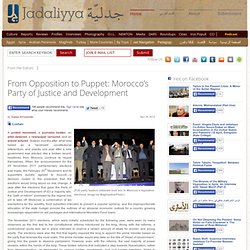
Sixteen months after what was hailed as a “landmark” constitutional referendum, and exactly one year after a new government was elected, like a broken record, headlines from Morocco continue to repeat themselves.
Morocco's second spring. There are cautionary tales in the Arab uprisings, as Syria has shown: not every revolution can be as successful as Tunisia's, not every aftermath is rosy.
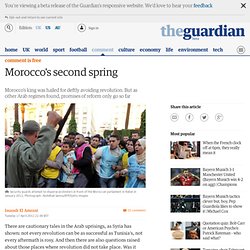
And then there are also questions raised about those places where revolution did not take place. Was it averted because there is wise and popular government, or has some kind of social shock merely been postponed? Last year Morocco seemed for a while to be following the path of its eastern neighbours. Protests were proliferating, with public participation unseen since the 1970s.
King Mohammed VI, whose legitimacy was never targeted by the protests – even if that of his regime was – deftly retook the initiative by proposing, and hurriedly passing, a new constitution. Many Moroccans were divided on this issue. Some recent events suggest that Moroccans will not be infinite in their patience as they await concrete signs that the reformist path has paid off. Morocco, the Gulf and the media. An interesting item at Angry Arab — Aljazeera and Morocco: "Yassine sent met this: "So al-Jazeera decided not to air the documentary on Morocco and the 20th of February Movement (nuqta sakhina), which they had been promoting for more than a week.

Why not? Again? (In November the same thing happened (back then the al-Jazeera crew was forbidden to go to Tanger and the al-Hoceima area: two centers of the Moroccan uprising). The Moroccan king recently 'gave' the Qatari emir some 4 5.000 hectares (=450 km²) in the Guelmim area so that the Qatari emir could go hunt there.
A Year After: The February 20 Protest Movement in Morocco. On the one-year anniversary of the February 20 protest movement in Morocco, (henceforth referred to as Feb. 20), the kingdom boasts relatively meager political progress.
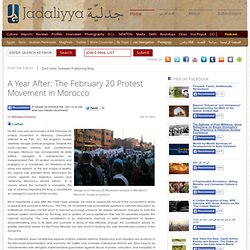
Despite the much-vaunted reforms and constitutional changes, Morocco has reinvigorated its state edifice, managed to outmaneuver an inexperienced Feb. 20 protest movement, and engaged in a crackdown on freedom of the press and speech. In the last couple of weeks, the regime has arrested three Moroccans for crimes against his majesty’s person and “defaming Morocco’s sacred values.” King Hassan of Morocco and the Queen.
Creating Space for Independent Political Action in Morocco. Having a Conversation on Other Terms: Gender and the Politics of Representation in the New Moroccan Government. The recent parliamentary elections in Morocco have led to the creation of the first ever elected Islamist government in Morocco’s history.
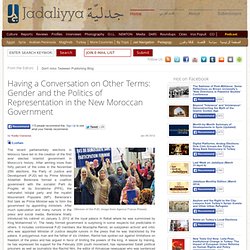
After winning more than forty percent of the votes in the November 25th elections, the Party of Justice and Development (PJD) led by Prime Minister Abdelilah Benkirane formed a coalition government with the socialist Parti du Progrès et du Socialisme (PPS), the nationalist Istiqlal party and the royalist Mouvement Populaire (MP). Benkirane’s first task as Prime Minister was to form the government by appointing ministers.
After much speculation and many rumors in the press and social media, Benkirane finally introduced his cabinet on January 3, 2012 at the royal palace in Rabat where he was summoned by King Mohammed VI. The newly formed government is surprising in some respects but predictable in others. Morocco's coming elections pose a litmus test. After Tunisia's historic election, it is now Morocco's turn to gear up for early polls and try to replicate that dramatic achievement in democracy.
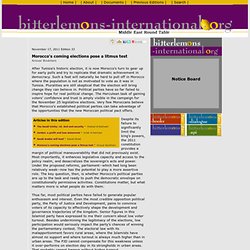
Such a feat will naturally be hard to pull off in Morocco where the population is not as motivated to vote as it was in Tunisia. Pluralities are still skeptical that the election will bring change they can believe in. Political parties have so far failed to inspire hope for real political change. The Herculean task of gaining voters' confidence and trust is amply visible in the campaign for the November 25 legislative elections. Very few Moroccans believe that Morocco's established political parties can take advantage of the opportunities that the new Moroccan political pact offers. Thus far, most political parties have failed to generate popular enthusiasm and interest. As it stands, it would be unrealistic to expect a high turnout in the November election. Morocco's Next Government: New Actors, Same Script. Several weeks have passed since Morocco’s most recent parliamentary elections.
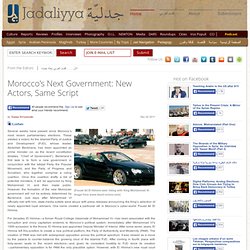
These yielded a victory for the Islamist Party of Justice and Development (PJD), whose leader, Abdelilah Benkirane, has been appointed as prime minister (or, as the recent constitution dictates, “Chief of Government”). Benkirane’s first task is to form a new government in conjunction with the Istiqlal Party, the Popular Movement, and the Party of Progress and Socialism, who together comprise a ruling coalition. Ibn Kafka's obiter dicta – divagations d'un juriste marocain en liberté surveillée.